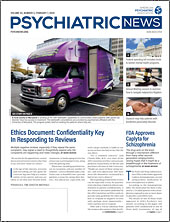While underused in the United States, the antipsychotic clozapine is considered to be the best option for people with schizophrenia who do not improve with other medications. Still, between 40% to 60% of patients with treatment-resistant schizophrenia will not experience significant symptom improvements when taking clozapine—a condition known as clozapine resistance or ultra-resistant schizophrenia.
How can psychiatrists help patients who do not experience symptom improvements after trying several antipsychotics, including clozapine?
Confirm It’s the Right Dose
If a patient is not responding to clozapine, the first step is to make sure that his or her dose is optimized, said Robert Cotes, M.D., an associate professor of psychiatry at Emory University School of Medicine and director of Emory’s clinic for patients with persistent symptoms of psychosis.
Though some patients will show a response at lower doses, Cotes said a plasma clozapine concentration of at least 350 ng/ml is typically ideal. The required dose to achieve this range can vary greatly depending on factors such as a patient’s sex, weight, ethnicity, smoking status, and genetics.
“It’s important to start [patients on a] low [dose] and check clozapine levels in the blood regularly as you gradually titrate up,” Cotes said. “Don’t raise the dose too fast, though, as rapid titration can lead to poor tolerability and adverse effects like inflammation and fever.”
Some patients may require plasma clozapine levels higher than 350 ng/ml, said Jonathan Meyer, M.D., a clinical professor of psychiatry at the University of San Diego. Titration should be stopped at 1,000 ng/ml or whenever tolerability due to clozapine side effects becomes an issue. Weight gain, sedation, and constipation are common side effects of clozapine, while seizures, heart problems, or neutropenia—a disorder in which white blood cell counts plummet rapidly—are rarer but severe effects. (The risk of neutropenia is why patients taking clozapine require regular blood monitoring.)
Consider Augmentation Strategies
If a patient continues to experience positive symptoms such as hallucinations and delusions once clozapine levels are optimized, the psychiatrist and patient should discuss augmentation strategies. Meyer recently wrote a textbook on clozapine prescribing called The Clozapine Handbook that includes a chapter on clozapine resistance.
“We have to remember that clozapine is not a miracle cure for negative symptoms like apathy or social isolation, so pursuing augmentation strategies is most relevant when a patient has residual positive symptoms,” Meyer said.
Meyer recommends augmenting clozapine with another antipsychotic as a first step. It may seem odd to combine antipsychotics (particularly ones that did not work for the patient in the past), but Meyer pointed out that clozapine operates by a different mechanism than other antipsychotics, so the two agents may not overlap in terms of their receptor targets. The preferred options, Meyer said, are the drugs aripiprazole, haloperidol, and risperidone, which carry a lower risk of common clozapine side effects like weight gain and sedation than some of the other antipsychotics.
For physicians worried about antipsychotic polypharmacy, Dan Siskind, M.D., Ph.D., an associate professor of medicine at the University of Queensland, said that there is also evidence to support augmenting clozapine with the antidepressant fluoxetine. Siskind has conducted several analyses on therapeutic strategies for clozapine-resistant schizophrenia. Fluoxetine increases available plasma clozapine levels, so the benefit may lie in the fact that the patient is receiving greater clozapine exposure.
Siskind’s analyses also suggested that the anticonvulsant and mood stabilizer valproate could be an effective adjunct, but both he and Meyer sounded a note of caution on these results. Most of the valproate studies have been conducted in China, which has been criticized for publishing many clinical research papers with positive findings that cannot be replicated elsewhere. Meyer added that valproate can also cause neutropenia at higher doses. He suggested avoiding this agent unless absolutely necessary, such as if a patient is experiencing seizures.
Another potential option for treating patients with ultra-resistant schizophrenia is to augment clozapine with electroconvulsive therapy (ECT).
“In terms of the level of symptom improvement, ECT augmentation is streets ahead of what has been shown for antipsychotic or antidepressant augmentation, at least in the short term,” Siskind said, noting there are not much data on the long-term benefits of ECT therapy on ultra-resistant patients. None of the ECT augmentation research has been placebo-controlled, however, because of the ethical concerns of giving a sham ECT procedure to patients, he noted.
Other Augmentation Options
If the recommended augmentations above fail, psychiatrists and/or patients might be tempted to try some less-well-studied options.
“There has been a lot of stuff thrown at this problem,” said Meyer. A few examples of medications tested in patients with ultra-resistant schizophrenia include erythropoietin (EPO, an agent that increases blood cell production), topiramate (another antiseizure medication), and sodium nitroprusside (a blood pressure medication).
“I would ignore these therapies that come off the beaten track,” Meyer said. “The evidence of effect usually comes from a single small study, and some of these treatments have severe side effects.”
One exception in Meyer’s eye is the antibiotic minocycline, which a few studies have suggested can improve schizophrenia symptoms via its anti-inflammatory properties. “The evidence is still limited, but minocycline is cheap and not harmful, so it might be worth a try.” Along these lines, Siskind is part of an Australian research team that has just completed a large clinical trial testing the antioxidant N-acetylcysteine as an augmentation strategy for ultra-resistant schizophrenia. The results are currently being analyzed.
Despite multiple therapeutic efforts, there will be patients that do not respond to treatment, Siskind noted. “We have to remember our desire to extinguish all psychotic symptoms may not be in the patient’s best interest. Our task as psychiatrists is to help people live their best lives even if there are ongoing symptoms.”
Cotes added, “Whatever path is chosen first, the choice of augmentation should be a shared decision by the clinician and patient, based on an understanding of what is most bothering the patient.” He noted that psychiatrists should not overlook the benefit of evidence-based psychosocial interventions such as cognitive-behavioral therapy for psychosis or supported employment programs that can help keep patients motivated and engaged in their recovery. ■
“Augmentation Strategies for Clozapine Refractory Schizophrenia: A Systematic Review and Meta-Analysis” is posted
here.

